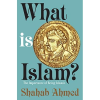My daughter just said no Muslims drink alcohol as it’s against their religion. I said loads do, she said well they’re not true Muslims.
Welcome to religion.
Probably the most significant academic work on Islam to be published in recent times is this magisterial study by the late Shahab Ahmed. That's Mughal emperor Jahangir depicted on the cover, resplendent with a wine cup in one hand and the Qur’an in the other.

I haven't read my copy yet. But here's how it starts off:

There were once taverns throughout the Islamic world, thus demonstrating that the Quranic prohibition on alcohol has not always been strictly observed. Indeed, the Sufi mystics thought intoxication with wine brought you closer to Allah.
Plus, one of the most revered of all Muslim poets is the bisexual, hellraising, Shane MacGowan-like Abu Nuwas. In 1972 he was immortalized in bronze, wine glass in hand, and his statue was placed at the head of Abu Nuwas Street in Baghdad. Although I understand that the street was eventually renamed by the puritanical Islamist authorities, as far as I know it's still there. So it's lasted longer than the ones erected in honour of Saddam Hussein.
Here's a sample of his poetry:
'Take revenge on Ramadan,
With the fine wines aged in clay,
And spend Shawwal in revelry,
As the songstress plays,
May you be, without exception,
Drunk at least twice a day,
The months I find most agreeable,
Are from Ramadan furthest away.'
Shawal is the month that follows Ramadan in the Islamic calendar.
Although I haven't read Ahmed yet, I have just finished Juan Cole's recent biographical study of the Prophet, which is somewhat provocatively titled
Muhammad : Prophet of Peace Amid the Clash of Empires. I say 'provocatively' because on X I have often seen Islam described as a 'religion of peace' sarcastically by anti-Muslim bigots. Well, in actual fact, according to Cole, it may have started off as just that. In case anyone wants to follow up on this, a pdf of the entire text can easily be found online.
But anyway, here's something intriguing that Cole states at the end of the book:
'
The Qur’an shows evolution in its treatment of a few laws. It begins by forbidding Believers to come to prayers drunk, but later verses say there is more harm than good in alcohol. (It never did outlaw the latter, inasmuch as it mentions no punishment and, therefore, specifies no legal infraction.)'
Going back to Ramadan, there are several reasons why it is practised. One of them is because it can engender in Muslims a sense of what people who are poor and hungry/thirsty go through. At the end of Ramadan a payment is made by those who can afford it (I think it is called Zakat al-Fitr) to enable the poor to celebrate Eid al-Fitr, the festival that follows.
An obligatory payment of Zakat is also made at other times if I remember rightly. And the recipients would be ‘poor residents of Islamic lands, [who] irrespective of religion, could expect to be entitled to a portion of the government’s zakat-revenues’.




